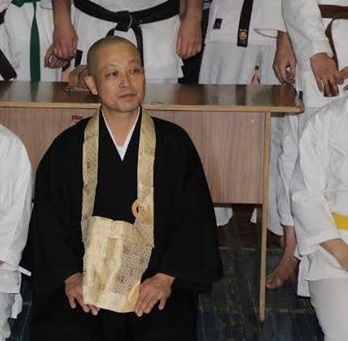仏陀は「私物をもってはいけない、着物は三枚だけ」と規則を定められました。現代社会において私たちがこの規則を守ることは不可能です。それでも禅の専門道場においては、ほぼこれに近いといえるでしょう。
道場に入門するときは、袈裟文庫といって小さな箱を首から下げます。この中には袈裟と食事用の木のお椀、カミソリ、白衣一枚を入れ、「涅槃金」といって旅の途中で死んだ場合の火葬費用を封筒に入れてこの裏に貼っておきます。私が入門の前日に師匠に言われたことを思い出します。
「修行がつらくなったら、涅槃金をこれに貼り付けたことを思い出しなさい」と。
着ているものは木綿の着物と麻衣、脚絆と草鞋に網代笠です。この姿は中国から日本に禅が伝えられて900年間、かわっていません。かわったといえば、麻衣や網代笠など需要が少ないために高価になったことでしょう。
禅堂の生活は何もかもが一般の生活と違うのですが、最も気を使うのは「水の扱い方」です。朝起きたらタライの水で口をゆすぎ、顔を洗うのですが、小さな柄杓で一人三杯までです。掃除のときはバケツに水を汲んで雑巾を洗いますが、その水は畑か植木に撒きます。台所当番(典座=てんぞ)は最も水に気を使う役目です。米を洗ったとぎ汁は畑に撒きます。これはよい肥料になります。すべてそのように、水には細心の注意をはらいます。水の節約は「エコの原点」といえるでしょう。
入浴は5日に一度です。食べ物は採食ですのでさほどよごれません。夏は汗をかきますので、作務(作業)の後、かかり湯をします。風呂場は三黙堂(禅堂、食堂、浴堂)といっておしゃべりは禁止です。脱衣場には入浴中に悟りを開いたとされるバッタバラ菩薩を祀ってあります。その前で拝をします。入浴時間は線香の半分燃える間、15分以内です。
当番は師匠の背中を流します。これには厳格な作法があって、タオルの渡し方からお湯の掛け方、洗面器の置き方まで教えられます。
浴頭(よくじゅう=風呂係)
「おねがいします。お背中を流しましょう」
師匠
「はい。ごくろうさま」
禅堂では日々の生活のすべてが≪エコ≫です。そのことが自然に身につかなければ意味がありません。「物には命がある。水にも命があると思いなさい」と入門のころ老師に教えられたことを思い出します。
水にも命があると思えるかどうか、それがエコの原点でしょう。

土曜坐禅会(6:30~8:00)
●坐禅会 毎週土曜日午前6:25~8:00 久留米市宮の陣町大杜1577-1圓通寺
初心者歓迎 参加費無料 詳細は電話でお問い合わせください。℡0942-34-0350
●学校やクラブなど団体研修 坐禅申し込み随時うけたまわります。
費用はご希望に応じます。宿泊はありません。出張講座もいたします。

道場に入門するときは、袈裟文庫といって小さな箱を首から下げます。この中には袈裟と食事用の木のお椀、カミソリ、白衣一枚を入れ、「涅槃金」といって旅の途中で死んだ場合の火葬費用を封筒に入れてこの裏に貼っておきます。私が入門の前日に師匠に言われたことを思い出します。
「修行がつらくなったら、涅槃金をこれに貼り付けたことを思い出しなさい」と。
着ているものは木綿の着物と麻衣、脚絆と草鞋に網代笠です。この姿は中国から日本に禅が伝えられて900年間、かわっていません。かわったといえば、麻衣や網代笠など需要が少ないために高価になったことでしょう。
禅堂の生活は何もかもが一般の生活と違うのですが、最も気を使うのは「水の扱い方」です。朝起きたらタライの水で口をゆすぎ、顔を洗うのですが、小さな柄杓で一人三杯までです。掃除のときはバケツに水を汲んで雑巾を洗いますが、その水は畑か植木に撒きます。台所当番(典座=てんぞ)は最も水に気を使う役目です。米を洗ったとぎ汁は畑に撒きます。これはよい肥料になります。すべてそのように、水には細心の注意をはらいます。水の節約は「エコの原点」といえるでしょう。
入浴は5日に一度です。食べ物は採食ですのでさほどよごれません。夏は汗をかきますので、作務(作業)の後、かかり湯をします。風呂場は三黙堂(禅堂、食堂、浴堂)といっておしゃべりは禁止です。脱衣場には入浴中に悟りを開いたとされるバッタバラ菩薩を祀ってあります。その前で拝をします。入浴時間は線香の半分燃える間、15分以内です。
当番は師匠の背中を流します。これには厳格な作法があって、タオルの渡し方からお湯の掛け方、洗面器の置き方まで教えられます。
浴頭(よくじゅう=風呂係)
「おねがいします。お背中を流しましょう」
師匠
「はい。ごくろうさま」
禅堂では日々の生活のすべてが≪エコ≫です。そのことが自然に身につかなければ意味がありません。「物には命がある。水にも命があると思いなさい」と入門のころ老師に教えられたことを思い出します。
水にも命があると思えるかどうか、それがエコの原点でしょう。

土曜坐禅会(6:30~8:00)
●坐禅会 毎週土曜日午前6:25~8:00 久留米市宮の陣町大杜1577-1圓通寺
初心者歓迎 参加費無料 詳細は電話でお問い合わせください。℡0942-34-0350
●学校やクラブなど団体研修 坐禅申し込み随時うけたまわります。
費用はご希望に応じます。宿泊はありません。出張講座もいたします。

The sixth master Hui-neng 六祖慧能

“The sixth master Hui-neng“
Correctly, Hui-neng is called Dajian Hui-neng Daishi (683-713) as a posthumous name. He was born in Guangzhou and he was the sixth successor from Bodhidharma. So, he was called the sixth master. When he was only three years old, his father was died. He lived in extreme poverty with his mother, which was likely cut firewood at the hill and sell them at the market.
One day at his twenty four years old, Hui-neng listened to one customer chanting Vajra sutra (the diamond pannya sutra) at the market. At that time, he felt something special to one passage of the sutra and asked the customer.
‘Where do you learn the sutra?’
The customer answered.
‘I took lessons from Zen master Khonin at Tozenin. Hundreds of monks and ordinary people gather to take lessons. Why don't you take it with us?’
Hui-neng said to him.
‘I cannot go to study because I should take care of my elderly mother.’
The customer said.
‘In that case, I will give you thirty silver to care for your mother.’
Hui-neng was surprised and answered.
‘I can’t come immediately, but I will ask someone to nurse my mother and will come back to see you.’
Later, Hui-neng had a chance to listen to the lecture of Nirvana sutra by a nun and began to study from Zen master Khonin. However it was not as a disciple. It was a training in kitchen work such as grinding flour and serving meals to seniors. He was small and powerless so he tried hard to grind flour on the mortar.
Eight months later, Zen master Khonin said to the disciples.
“I'm going to choose my successor, so everyone should submit your poem. I will decide the successor by whose poem is best.”
Hui-neng could not write and read characters, so he asked his colleague to write his poem, and submitted it to the master. The master approved Hui-neng's enlightenment as soon as he read the poem and gave him a Buddhist robe and a wooden bowl as a token of the successor. And the master said to him.
‘Leave here and go south. You should lie low for a time. In the near future you can go out into the world and spread Buddha’s dharma.’
Hui-neng left the temple during the night secretly, and was hiding in a fisherman's house. Four years later, he entered the Buddhist priesthood and became a formal priest. Then he became the chief priest of Cáoxī bǎo lín sì (曹渓寳林寺) and archived the great work as a Zen master.
土曜坐禅会(6:30~8:00)
●坐禅会 毎週土曜日午前6:25~8:00 久留米市宮の陣町大杜1577-1圓通寺
初心者歓迎 参加費無料 詳細は電話でお問い合わせください。℡0942-34-0350
●学校やクラブなど団体研修 坐禅申し込み随時うけたまわります。
費用はご希望に応じます。宿泊はありません。出張講座もいたします。

“The sixth master Hui-neng“
Correctly, Hui-neng is called Dajian Hui-neng Daishi (683-713) as a posthumous name. He was born in Guangzhou and he was the sixth successor from Bodhidharma. So, he was called the sixth master. When he was only three years old, his father was died. He lived in extreme poverty with his mother, which was likely cut firewood at the hill and sell them at the market.
One day at his twenty four years old, Hui-neng listened to one customer chanting Vajra sutra (the diamond pannya sutra) at the market. At that time, he felt something special to one passage of the sutra and asked the customer.
‘Where do you learn the sutra?’
The customer answered.
‘I took lessons from Zen master Khonin at Tozenin. Hundreds of monks and ordinary people gather to take lessons. Why don't you take it with us?’
Hui-neng said to him.
‘I cannot go to study because I should take care of my elderly mother.’
The customer said.
‘In that case, I will give you thirty silver to care for your mother.’
Hui-neng was surprised and answered.
‘I can’t come immediately, but I will ask someone to nurse my mother and will come back to see you.’
Later, Hui-neng had a chance to listen to the lecture of Nirvana sutra by a nun and began to study from Zen master Khonin. However it was not as a disciple. It was a training in kitchen work such as grinding flour and serving meals to seniors. He was small and powerless so he tried hard to grind flour on the mortar.
Eight months later, Zen master Khonin said to the disciples.
“I'm going to choose my successor, so everyone should submit your poem. I will decide the successor by whose poem is best.”
Hui-neng could not write and read characters, so he asked his colleague to write his poem, and submitted it to the master. The master approved Hui-neng's enlightenment as soon as he read the poem and gave him a Buddhist robe and a wooden bowl as a token of the successor. And the master said to him.
‘Leave here and go south. You should lie low for a time. In the near future you can go out into the world and spread Buddha’s dharma.’
Hui-neng left the temple during the night secretly, and was hiding in a fisherman's house. Four years later, he entered the Buddhist priesthood and became a formal priest. Then he became the chief priest of Cáoxī bǎo lín sì (曹渓寳林寺) and archived the great work as a Zen master.
土曜坐禅会(6:30~8:00)
●坐禅会 毎週土曜日午前6:25~8:00 久留米市宮の陣町大杜1577-1圓通寺
初心者歓迎 参加費無料 詳細は電話でお問い合わせください。℡0942-34-0350
●学校やクラブなど団体研修 坐禅申し込み随時うけたまわります。
費用はご希望に応じます。宿泊はありません。出張講座もいたします。
動画
Zen lecture



















